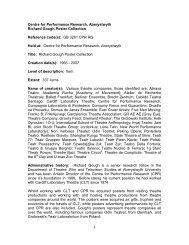Since August 2001, the Mercator Centre at the University of Wal
Since August 2001, the Mercator Centre at the University of Wal
Since August 2001, the Mercator Centre at the University of Wal
Create successful ePaper yourself
Turn your PDF publications into a flip-book with our unique Google optimized e-Paper software.
Towards a Welsh-Language Daily Newspaper<br />
Angharad Philpott<br />
<strong>Since</strong> <strong>August</strong> <strong>2001</strong>, <strong>the</strong> <strong>Merc<strong>at</strong>or</strong> <strong>Centre</strong> <strong>at</strong> <strong>the</strong> <strong>University</strong> <strong>of</strong> <strong>Wal</strong>es, Aberystwyth, has<br />
been researching how to effectively found and maintain a Welsh language daily<br />
newspaper. The project is sponsored by <strong>the</strong> European Commission, The Welsh<br />
Bureau for Lesser Used Languages, <strong>the</strong> Welsh Development Agency and <strong>the</strong><br />
<strong>University</strong> <strong>of</strong> <strong>Wal</strong>es, Aberystwyth. The project’s director is Ned Thomas and<br />
Angharad Philpott was its project <strong>of</strong>ficer.<br />
The enterprise was sparked by <strong>Merc<strong>at</strong>or</strong>’s experience <strong>of</strong> helping to found <strong>the</strong><br />
European Society <strong>of</strong> Minority Language Press, which was founded to promote cooper<strong>at</strong>ion<br />
between Europe’s minority language newspapers. It now has 26 members<br />
and has already begun co-oper<strong>at</strong>ing in <strong>the</strong> field <strong>of</strong> advertising and inform<strong>at</strong>ion<br />
technology. It also aims to support <strong>the</strong> founding <strong>of</strong> o<strong>the</strong>r minority language<br />
newspapers.<br />
The situ<strong>at</strong>ion and experiences <strong>of</strong> <strong>the</strong> society’s members vary quite significantly.<br />
7,500,000 C<strong>at</strong>alans succeed in maintaining 5 daily newspapers with a circul<strong>at</strong>ion<br />
ranging from 4,000 to 90,000. Never<strong>the</strong>less, <strong>the</strong>re are some minorities with far fewer<br />
speakers who also succeed in maintaining a daily newspaper. Perhaps <strong>the</strong> most<br />
striking example is th<strong>at</strong> <strong>of</strong> <strong>the</strong> Swedes in Finland, where 300,000 people succeed in<br />
maintaining no less than 10 daily newspapers.<br />
The experiences <strong>of</strong> <strong>the</strong>se minorities is evidence th<strong>at</strong> it is entirely possible to found and<br />
maintain a daily newspaper in a way th<strong>at</strong> is quite different from th<strong>at</strong> <strong>of</strong> more<br />
mainstream press. It is not necessary to have a large company with substantial capital<br />
and a circul<strong>at</strong>ion <strong>of</strong> hundreds <strong>of</strong> thousands, to sustain a daily newspaper.<br />
Over recent months, <strong>the</strong> project has visited many daily minority language papers<br />
across Europe and has invited many editorial staff to <strong>the</strong> Society in <strong>Wal</strong>es. We were
aware th<strong>at</strong> many minority papers share similar problems, and were very keen to<br />
discuss <strong>the</strong>m.<br />
One <strong>of</strong> <strong>the</strong> central ways <strong>of</strong> ensuring <strong>the</strong> success <strong>of</strong> <strong>the</strong>se papers is to have a core <strong>of</strong><br />
subscribers. Subscription will normally be for a period <strong>of</strong> one year through an up-<br />
front payment. There are many advantages to subscription. In <strong>the</strong> case <strong>of</strong> some papers,<br />
it is significantly cheaper to buy <strong>the</strong>m through subscription as <strong>the</strong> price for occasional<br />
purchase is higher. O<strong>the</strong>r papers <strong>of</strong>fer free cinema tickets, along with discounts for<br />
o<strong>the</strong>r popular goods and activities.<br />
Technology also plays a leading role in <strong>the</strong> running <strong>of</strong> <strong>the</strong>se papers. Although <strong>the</strong>y are<br />
printed on paper, many <strong>of</strong> <strong>the</strong> production processes are highly computerised, e.g. <strong>the</strong><br />
subscription system. It is also possible for journalists to send <strong>the</strong>ir work effectively<br />
and efficiently via e-mail, with readers in Finland using <strong>the</strong> Internet to send<br />
photographs <strong>of</strong> <strong>the</strong>ir children to <strong>the</strong> newspaper.<br />
To safeguard <strong>the</strong> papers, <strong>the</strong>re is <strong>of</strong>ten a wide ownership. This prevents powerful<br />
individuals or groups, who may not be interested in <strong>the</strong> paper, its language or<br />
community, from taking over <strong>the</strong> newspaper. In <strong>the</strong> case <strong>of</strong> Flensborg Avis, <strong>the</strong> daily<br />
newspaper for Danes in Germany, 1,500 out <strong>of</strong> a popul<strong>at</strong>ion <strong>of</strong> 50,000 are<br />
shareholders. Also, if any shares in <strong>the</strong> newspaper are sold, <strong>the</strong> editor must approve<br />
<strong>the</strong> buyer.<br />
Apart from <strong>Merc<strong>at</strong>or</strong>’s initial input into <strong>the</strong> European Society <strong>of</strong> Minority Language<br />
Press, it was not possible for <strong>Wal</strong>es to take any fur<strong>the</strong>r part in it as <strong>the</strong>re is no daily<br />
Welsh language newspaper. <strong>Wal</strong>es has a popul<strong>at</strong>ion <strong>of</strong> a little under 3 million and<br />
according to figures in <strong>the</strong> last census (<strong>2001</strong>), 16.3% (457,000) <strong>of</strong> <strong>the</strong> popul<strong>at</strong>ion are<br />
able to speak, read and write <strong>the</strong> language. 575,000 say <strong>the</strong>y can speak <strong>the</strong> language,<br />
whilst 797,000 say <strong>the</strong>y can understand <strong>the</strong> language.<br />
As <strong>the</strong>re is and never has been a daily Welsh language newspaper, much <strong>of</strong> <strong>the</strong><br />
research has focussed on learning whe<strong>the</strong>r <strong>the</strong> people <strong>of</strong> <strong>Wal</strong>es would welcome such a<br />
public<strong>at</strong>ion. Independent research was undertaken whereby people were asked
‘Would you like to read a daily Welsh language newspaper?’ A little over a third <strong>of</strong><br />
Welsh speakers said <strong>the</strong>y would want to read such a paper. The project also produced<br />
a questionnaire, which was distributed widely throughout <strong>Wal</strong>es. There was a strong<br />
response to it, with over 1,000 people replying, and with 80% saying <strong>the</strong>y would be<br />
willing to subscribe to a daily Welsh language newspaper if one was available. The<br />
questionnaire also enquired whe<strong>the</strong>r people would be willing to collect subscriptions<br />
in <strong>the</strong>ir local area or work place. There was a positive response, with 40% willing to<br />
do so. A meeting was held in April and many <strong>of</strong> <strong>the</strong>se people were invited to discuss<br />
<strong>the</strong> cre<strong>at</strong>ion <strong>of</strong> local networks for <strong>the</strong> paper. There is an aim to establish groups who<br />
will be locally active on behalf <strong>of</strong> <strong>the</strong> paper by collecting subscriptions and assisting<br />
in <strong>the</strong> recruitment <strong>of</strong> local journalists.<br />
It is evident th<strong>at</strong> <strong>the</strong> paper’s content will be a key factor in its success, and we have<br />
spent a significant amount <strong>of</strong> time researching into exactly wh<strong>at</strong> <strong>the</strong> people <strong>of</strong> <strong>Wal</strong>es<br />
would like to see in a Welsh language daily paper. News was a popular choice, with<br />
83% wanting to see news from <strong>Wal</strong>es included. 83% also wanted to see intern<strong>at</strong>ional<br />
news, with 95% wanting local news and 78% British news. 84% <strong>of</strong> people were keen<br />
to see items on political issues, with 77% wanting items on n<strong>at</strong>ure and <strong>the</strong><br />
environment, 75% wanting to see articles on educ<strong>at</strong>ion and 70% wanting news on <strong>the</strong><br />
arts.<br />
Clearly, sponsorship is one <strong>of</strong> <strong>the</strong> most significant factors to consider in whe<strong>the</strong>r it is<br />
possible to found a daily newspaper. It has already been said th<strong>at</strong> developing a core <strong>of</strong><br />
subscribers is key to its success, as it is not possible to depend on <strong>the</strong> finance provided<br />
by those who buy <strong>the</strong> paper occasionally. We also hope to ensure a wide ownership <strong>of</strong><br />
<strong>the</strong> paper by encouraging many small shareholders to invest. Income will also be<br />
gener<strong>at</strong>ed from advertisements and o<strong>the</strong>r ventures. It is possible th<strong>at</strong> grants will also<br />
provide some assistance.<br />
The research project has since ended. Our work shows th<strong>at</strong> although it is not possible<br />
to transplant models from Europe into <strong>Wal</strong>es, <strong>the</strong> experience <strong>of</strong> <strong>the</strong>se papers<br />
never<strong>the</strong>less show it is not impossible to found a Welsh language daily newspaper.<br />
Research also shows th<strong>at</strong> many people in <strong>Wal</strong>es are enthusiastic about having such a
paper, and who are, in principle, willing to subscribe to it. We have since founded a<br />
company to proceed with <strong>the</strong> work on a more commercial basis. Our hope is to set up<br />
a daily Welsh language newspaper in <strong>the</strong> near future.<br />
Angharad Philpott is a member <strong>of</strong> <strong>the</strong> newspaper company who currently works in<br />
Treforest, Pontypridd. She was previously a project <strong>of</strong>ficer with <strong>the</strong> research team<br />
into <strong>of</strong> <strong>the</strong> Welsh language daily newspaper in <strong>the</strong> <strong>Merc<strong>at</strong>or</strong> <strong>Centre</strong>, Aberystwyth


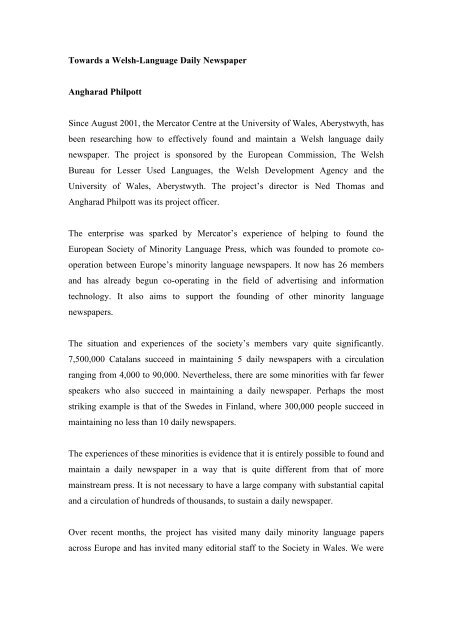
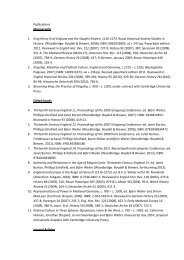
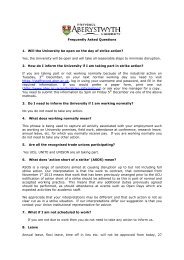

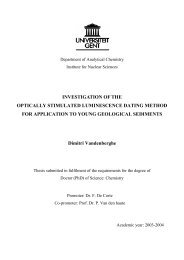
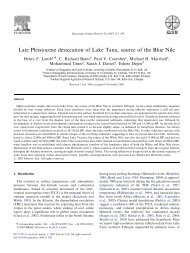
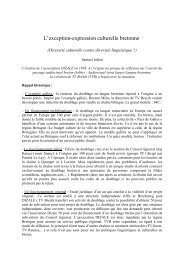
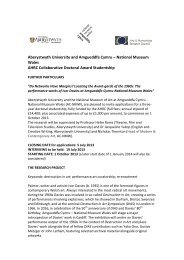



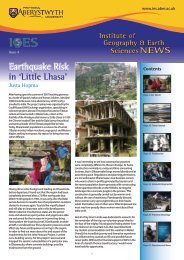
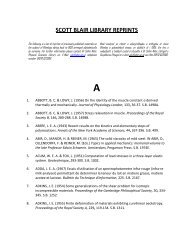
![[pdf] the council - Aberystwyth University](https://img.yumpu.com/8200062/1/184x260/pdf-the-council-aberystwyth-university.jpg?quality=85)
